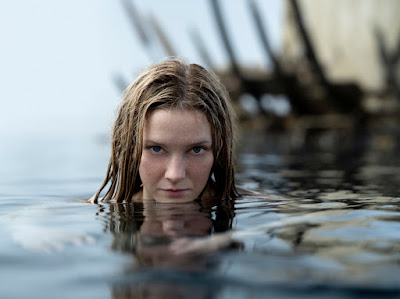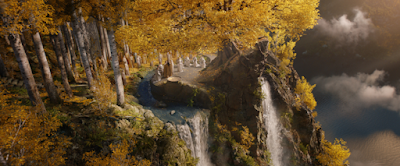The Concept of Warrior Poets
The Warrior Poet has existed at least as far back as King David, who was a famous fighter from his youth (1 Sam 17:1-58) yet also wrote many of the Psalms. At least one Icelandic saga follows the career of a man who earns a place as a fighting man by spinning poems for kings. And in in Middle High German literature, we see knights also serving as court poets. J.R.R. Tolkien was influenced by medieval literature, so perhaps it's no surprise that he includes poetry, usually in the form of song, in his works - often recited, if not composed, by heroic fighting figures like Aragorn and the Elves. Tolkien himself could be classified as a Warrior Poet, having served in World War One. But how did poetry figure into that medieval world whose literature Tolkien was so inspired by?
The Middle High German Poet Knight
 |
| From Die Minnesinger in Bildern der Manessischen Handschrift. |
Some evidence that some Middle High German poets were also knights comes from the existence of a subgenre of courtly love songs (Minnesang) called ‘Kreutzlieder,’ in which the poets write about (or are inspired by) being on crusade. Minnesang poet Friedrich von Hausen, for example, died falling off his horse while on crusade. The ‘Kreutzlieder’ writers were not necessarily just knights who happened to enjoy writing poetry in their free time; although they were likely to have been on crusade in a primarily military function, they may have also had a specifically “lyrical role” as something akin to a court poet.
Additionally, at least two Middle High German poets make claims within their verse that they are both poets and knights: Der von Kürenberg, and Hartmann von Aue. Der von Kürenberg’s references the poet knight in the lines:*
dô hôrt ich einen rîter vil wol
singen
in Kürenberger wîse al ûz der menigîn
There
I heard a knight sing very well
In the Kürenberger style among the people*
These line describe a man (presumably von Kürenberg himself) who is on the one hand a knight, and on the other hand a singer, and probably composer, of Minnesang.
In the beginning of his epic poem Iwein, von Aue refers to himself as
Ein rîter, der gelêret was
unde ez an den buochen las,
swenner sîne stunde
niht baz bewenden kunde
A knight, who was learned
and read books
whenever he didn't know
how to better use his time*
He makes a similar claim in the opening five lines of Arme Heinrich. In both instances, the poet von Aue specifically names himself as the man in question, and in both cases, he refers to himself as a knight.
It was common for a Middle High German knight to also hold an administrative role as a 'dienstman' (servant). Some works, such as Parzival, detail knights serving as chamberlains, butlers and similar roles. Knights also served in ceremonial functions, such as receiving and looking after guests at court. Von Aue provides more evidence of the existence of these secondary roles, calling himself not only a knight in Arme Heinrich, but also a 'dienstman.'
With a number of official secondary roles knights might fill, it is plausible that one of the duties a knight might be called on to perform, if he had the ability and the skill, was that of entertaining the court by the composition and recitation of poetry. Professional poets are not the only ones who composed verse for their lords’ courts. Performances featured songs composed by other “court members, including a significant number of noblemen themselves.” Hartmann von Aue, for example, seems to have written his poetry for knights and ladies at court.
The evidence that von Aue was writing for a courtly audience is also found in Erec, which is not a simple translation, but is rather adapted for a German audience that “would have had a rather different interpretation of legal, social, and ethical nuances than” the original poem’s audience. And with all the other roles knights filled besides fighting, including seeing to their own fifes and their families, it seems unlikely they would write very much poetry purely for their own enjoyment.
Further support for the idea that writing poetry was in some
way part of these men’s duties as knights, rather than a mere free time
activity, is their fame in their day. Walther von der Vogelweide was well known
as a poet when he was alive, and his work was cited by later medieval poets. And the fact that these Poet Knights’ works have survived in written form
gives them an official flavor, as it was their patrons who “made available the
resources to have the poets’ work preserved in writing.” German Poet Knights writing during this period seem likely to have been recipients of courtly patronage, even if they were not official court poets.
Little has been written about the practical roles of the Poet Knights. We do not know how many of the Middle High German poets served as knights, but it is clear that some of them did. Unlike the skaldic poets, there is no sense that poetry could, in and of itself, open doors to wealth or service. Instead, the German Poet Knights were recruited to form their lords’ retinues as fighting men; administrative jobs and poetic undertakings followed. They were knights; first and foremost, making them true Warrior Poets.
References:
Arnold,
Benjamin. German Knighthood 1050-1300 (Oxford: Clarendon Press, 1985).
Hartmann von Aue. Iwein. Edited by Georg F. Benecke, et al. (Berlin; New York: Walter de Gruyter, 2001).





